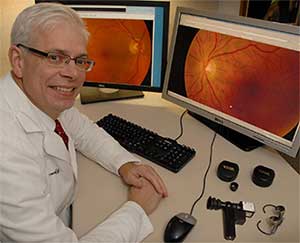Twenty-two years ago, Michael Abramoff, MD, PhD, an ophthalmology resident at the time, noticed that ophthalmologists saw many patients with diabetes with signs of late-stage diabetic retinopathy (DR) that caused irreversible vision loss.
Regular eye examinations are necessary for the diagnosis of diabetic retinopathy at an early stage, when it can be treated with the best result. Sadly, less than 50 percent of people with diabetes adhere to the recommended schedule of yearly eye exams. This realization led Dr. Abramoff on a 22-year journey that involved moving to Iowa, recognizing that autonomous artificial intelligence (AI) is the most innovative frontier in medicine and founding IDx.
In April 2018, IDx became the first Food and Drug Administration-approved autonomous diagnostic AI system for detecting diabetic retinopathy in primary care. AI has long promised to increase healthcare affordability, quality and accessibility, but until IDx-DR, the FDA had never approved an autonomous AI diagnostic system for use in patient care.
Not only does this advancement pave the way for ophthalmology; it also breaks down barriers for other specialties to innovate, lower treatment costs and improve patient care.
The pivotal trial that led to the FDA’s approval of IDx-DR was conducted at 10 sites across the U.S. and involved 900 patients with diabetes. In the study, the IDx-DR system performed well when compared to the Wisconsin Fundus Photograph Reading Center photographs and certified graders. Against this rigorous standard, IDx-DR exceeded all prespecified superiority endpoints at a sensitivity of 87.2 percent, specificity of 90.7 percent and imageability rate of 96.1 percent. The study clearly demonstrated AI’s ability to bring specialty-level diagnostics to primary care settings.
Based on these results, the FDA authorized this AI camera system to be used by healthcare providers to automatically detect worse than mild diabetic retinopathy in adults (22 years of age or older) diagnosed with diabetes who have not been previously diagnosed with diabetic retinopathy. The FDA had never before approved an autonomous AI system that does not require a clinician to interpret the images or results, which makes IDx-DR usable by primary care providers.
What does this mean for ophthalmologists?

Michael Abramoff, MD, with the IDx-DR, an autonomous diagnostic AI system that helps detect more advanced forms of diabetic retinopathy.
With IDx-DR, patient referral pathways will change dramatically. Ophthalmologists can now partner with primary care clinics to use IDx-DR to detect diabetic retinopathy, increasing the odds that disease will be caught in its early stages and patients will be triaged to an appropriate eye care provider.
By improving access to disease screening, IDx-DR can catch diabetic retinopathy in patients who are not currently seeing an eye care specialist. Individuals with social or economic barriers to eye care are often the ones who do not arrive in our offices until symptoms of vision loss have already appeared. An IDx-DR exam can alert a patient that they have signs of diabetic retinopathy, making it far more likely they will enter the care of an ophthalmologist before it’s too late.
Advice to YOs
Dr. Abramoff has always been interested in mentorship of young ophthalmologists, so we asked Dr. Abramoff what advice he might give to residents and ophthalmologists in their first five years of practice:
“Papers, patents and awards are important," Dr. Abramoff said. "However, they should be the result of the primary focus; utilizing technology and discovery to improve the lives of your patients.”
* * *
About the authors: Andrea Tooley, MD, and Christopher Nathanial Roybal, MD, PhD, are both members of the YO Info editorial board. Dr. Tooley is an oculoplastics fellow at Columbia University in New York City. Dr. Roybal is in practice at Eye Associates of New Mexico in Albuquerque. He completed his vitreoretinal fellowship training at the University of Iowa.